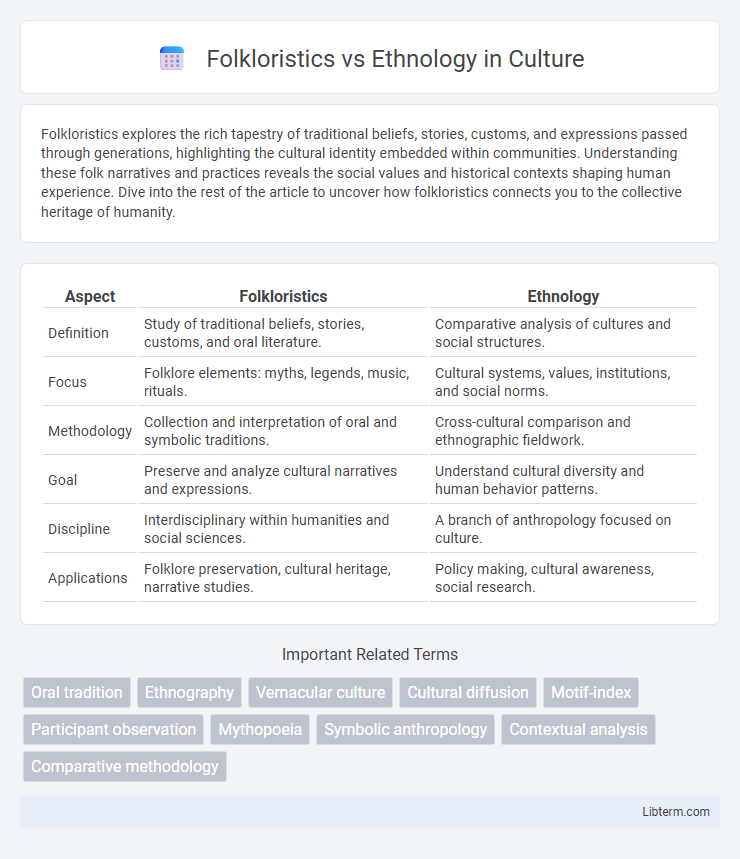Folkloristics explores the rich tapestry of traditional beliefs, stories, customs, and expressions passed through generations, highlighting the cultural identity embedded within communities. Understanding these folk narratives and practices reveals the social values and historical contexts shaping human experience. Dive into the rest of the article to uncover how folkloristics connects you to the collective heritage of humanity.
Table of Comparison
| Aspect | Folkloristics | Ethnology |
|---|---|---|
| Definition | Study of traditional beliefs, stories, customs, and oral literature. | Comparative analysis of cultures and social structures. |
| Focus | Folklore elements: myths, legends, music, rituals. | Cultural systems, values, institutions, and social norms. |
| Methodology | Collection and interpretation of oral and symbolic traditions. | Cross-cultural comparison and ethnographic fieldwork. |
| Goal | Preserve and analyze cultural narratives and expressions. | Understand cultural diversity and human behavior patterns. |
| Discipline | Interdisciplinary within humanities and social sciences. | A branch of anthropology focused on culture. |
| Applications | Folklore preservation, cultural heritage, narrative studies. | Policy making, cultural awareness, social research. |
Defining Folkloristics: Scope and Methods
Folkloristics is the systematic study of folklore, encompassing traditional beliefs, customs, stories, and practices transmitted orally or culturally within communities. Its scope includes analyzing verbal arts, material culture, rituals, and social customs to understand how they shape collective identity and cultural continuity. Methods in folkloristics combine fieldwork, ethnographic observation, and textual analysis to document and interpret folklore within specific social and historical contexts.
Understanding Ethnology: Focus and Framework
Ethnology centers on comparative analysis of cultures, examining social structures, customs, and belief systems to uncover patterns and variations among human societies. It employs cross-cultural frameworks and theoretical models to interpret cultural phenomena within broader anthropological contexts. This discipline prioritizes holistic understanding and synthesis of cultural data, distinguishing it from Folkloristics, which specifically focuses on traditional narratives, folklore, and oral expressions.
Historical Development of Both Fields
Folkloristics emerged in the 19th century as a discipline dedicated to collecting and analyzing traditional narratives, myths, and customs, emphasizing oral traditions and intangible cultural expressions. Ethnology developed concurrently, rooted in anthropology, focusing on comparative studies of cultures, social structures, and customs to understand human behavior and cultural variation. Both fields evolved through cross-disciplinary influences, with folkloristics contributing detailed cultural content while ethnology provided broader theoretical frameworks for interpreting cultural phenomena.
Key Theoretical Approaches in Folkloristics
Folkloristics emphasizes the analysis of oral traditions, rituals, and customs using structuralism, performance theory, and psychoanalytic approaches to uncover symbolic meanings and social functions within folklore. Ethnology broadly studies cultural practices and social structures, often relying on comparative methods and participant observation to understand cultural diversity. Key theoretical approaches in folkloristics include the formalist method, which categorizes folk tales by motifs and types, and the communicative model, focusing on the interaction between performer, context, and audience.
Ethnological Research Techniques and Practices
Ethnological research techniques emphasize participant observation, in-depth interviews, and comparative analysis to understand cultural practices and social structures within communities. Ethnologists often employ fieldwork methods that immerse researchers in everyday life, enabling detailed documentation of rituals, beliefs, and economic systems. Data collection in ethnology prioritizes qualitative insights, supported by audio-visual recordings and artifact analysis, to capture the complexity of human societies and cultural dynamics.
Comparative Analysis: Folkloristics vs Ethnology
Folkloristics concentrates on the systematic study and interpretation of folklore, including oral traditions, myths, and customs, emphasizing the analysis of cultural narratives and their functions within societies. Ethnology, in contrast, adopts a broader comparative approach by examining the social structures, practices, and cultural patterns across different ethnic groups to understand cultural similarities and differences. Comparative analysis highlights folkloristics' focus on specific cultural expressions, while ethnology contextualizes these within wider cultural frameworks and intergroup relations.
Overlapping Themes and Divergences
Folkloristics and ethnology both investigate cultural expressions and traditions, yet folkloristics centers on oral literature, myths, and folk practices, while ethnology examines broader social structures, customs, and cultural patterns. Overlapping themes include the study of rituals, narratives, and community identity, but divergences arise from folkloristics' emphasis on artistic forms and performative aspects versus ethnology's analytical approach to cultural systems and social organization. These distinctions shape methodologies, with folklorists often using narrative analysis and ethnologists employing comparative frameworks to understand cultural diversity.
Modern Interdisciplinary Perspectives
Modern interdisciplinary perspectives reveal that folkloristics and ethnology, while both studying cultural traditions, differ in scope and methodology; folkloristics concentrates specifically on oral traditions, folklore genres, and expressive culture, whereas ethnology examines broader social structures, customs, and cultural patterns. Advances in digital humanities and ethnographic methods enable scholars to analyze folklore within wider sociocultural contexts, integrating performative, historical, and linguistic data. This convergence fosters nuanced understanding of cultural identity and transmission processes, emphasizing dynamic interactions between local narratives and global influences.
Contributions to Cultural Heritage Studies
Folkloristics contributes to cultural heritage studies by systematically documenting oral traditions, rituals, and folklore, preserving intangible cultural expressions that shape community identities. Ethnology enhances understanding by comparing cultural practices across societies, revealing patterns and variations that inform the dynamic nature of cultural heritage. Together, these disciplines offer comprehensive insights into both the preservation and analytical interpretation of cultural heritage.
Future Trends in Folkloristics and Ethnology
Future trends in folkloristics emphasize digital ethnography and the integration of AI for analyzing oral traditions and cultural practices. Ethnology is increasingly adopting interdisciplinary approaches, incorporating environmental and global studies to address cultural change and identity in a rapidly transforming world. Both fields prioritize community collaboration and ethical representation to ensure culturally sensitive research methodologies.
Folkloristics Infographic

 libterm.com
libterm.com